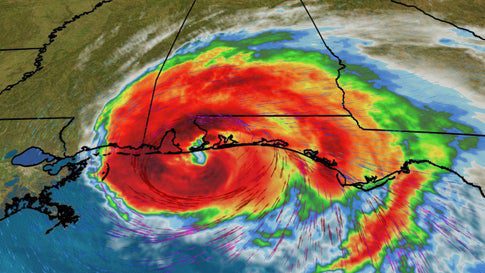 Will the 2023 Hurricane Season Be Active?
Will the 2023 Hurricane Season Be Active?
Forecasters, in general, predict a near- to slightly below-average year for hurricanes in the Atlantic. That’s in part because of the influence of an expected El Niño, which tends to reduce Atlantic hurricane activity.
Top forecasters from Colorado State University predict that 13 tropical storms will form in the Atlantic, of which six will become hurricanes.
But El Niño tends to boost hurricane activity in the eastern Pacific basin, so the west coast of Mexico could see an unusually active season.
How bad will the hurricane season be?Why this year’s forecast comes with ‘large uncertainty’
Contributing: National Oceanic Atmospheric Administration; National Hurricane Center
Hurricane Preparedness List
1. Bottled Water & Non-Perishable Food Items
The most important things to have on your hurricane preparedness list are enough bottled water and non-perishable food items to last you and your family at least three days. We recommend securing at least a week’s supply to ensure you’re covered.
It’s better to have more than you need because you can still use these items well after the storm passes. Here are recommended items for your hurricane checklist:
- Bottled water (7-day supply — one gallon per person, per day)
- Boxed juices and flavored drinks to mix it up
- Non-perishable foods (7-day supply)
- Ready-to-eat canned soups
- Canned vegetables, fruits and meats
- Granola, protein or other high-fiber bars
- Peanut butter, jerky and other high-energy foods
Pro Tip: Avoid comfort and junk foods, such as chips and cookies, as they don’t provide you with adequate nutrition to stay properly energized.
2. Tools & Other Hurricane Supplies
If the power goes out, which it regularly does during hurricanes, you’ll need enough tools, batteries and battery-powered devices to keep you comfortable after the sun goes down and without the electricity.
From emergency repairs to simply getting through the night without being bored, these tools and other supplies should be added to your hurricane checklist to get you through the storm.
- AA, AAA and D batteries
- Flashlight and headlamp (free up hands in the dark)
- Battery-powered radio (tuned to National Hurricane Center channel)
- Battery-powered phone charger
- Pliers, hammer and nails, and screwdrivers with screws (Flathead and Phillips)
- Duct tape or another strong adhesive
- Plastic or paper cups, plates and utensils
- Plastic or glass storage containers
- Portable waterproof container (for important documents such as insurance policies, birth certificates and deeds)
- Board games and a deck of cards
- Generator
- Waterproof clothing
- Sleeping bags
- Clean clothes and blankets
- Candles
- Matches, lighters or waterproof fire-starter
Pro Tip: Avoid using real candles and risking further damage by investing in battery-powered candles with a charger that can be used when the power is out.
3. First-Aid Kit & Sanitation Items
If you sustain a minor injury a first-aid kit and compilation of sanitation items can help to prevent further injury and disastrous infections. Similar to your hurricane supply of water and non-perishable food items, you should also have a seven-day hurricane supply of all the following first-aid and sanitation items.
- Adhesive and gauze bandages
- Gauze pads and adhesive cloth tape
- Hydrogen peroxide and antibacterial ointment
- Medical scissors and tweezers
- Aspirin, ibuprofen or acetaminophen
- Recently refilled prescription medications
- Non-latex gloves
- Antibacterial hand sanitizer, soap and hand wipes
- Insect repellent
Pro Tip: Keep your first-aid kit and sanitation items in a secure place inside a waterproof container just in case the rain waters get into your home.
Bonus: Extra Fuel
Gas stations within hurricane-affected areas tend to run out of fuel days or weeks before the initial strike, so it’s imperative to ensure you at least have a full tank in your car in the days leading up to landfall. If you have the ability or plan to use a generator, fill up extra containers and keep them in a safe place for later use.
Do not use generators inside your home or garage or near doors, windows or vents, as they emit carbon dioxide, which can become lethal to humans if breathed in.
The safest way to prepare for a hurricane is to get far away from its expected path of destruction. This will ensure you and your family stay safe. After all, you can repair and replace your home and belongings, but you cannot replace your life.
Joe Zarzaur is a Board Certified Civil Trial Attorney whose firm has been dedicated to promoting community safety since 2007. ZARZAUR LAW’S AREAS OF PRACTICE: Serious Personal Injury, Product Defect, Auto Accidents, Cycling Accidents, Motor Vehicle Accidents, Products Liability, Wrongful Death, Community Safety, Boat and Jet Ski Accidents, Slip and Fall Injuries, and more. Licensed in Alabama and Florida.
If you’ve been injured in a car accident, it’s important that you don’t make any rash decisions. Put yourself in the best possible position to receive the justice you deserve. It is also important to consult with a Board-Certified Trial Lawyer who has the knowledge and experience to help you. We know accidents can be stressful, and we want to make the process as easy as possible for you.
Call Zarzaur Law, P.A. today at (855) Hire-Joe for a free legal consultation or visit www.zarzaurlaw.com.